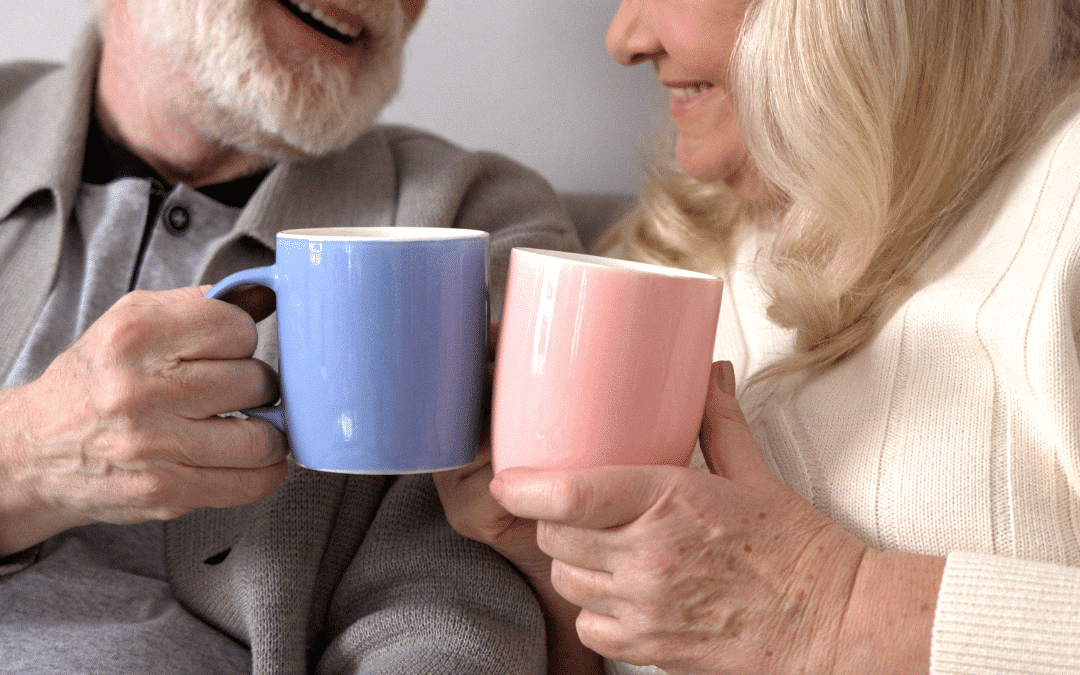The winter blues, or the more extreme SAD (seasonal affective disorder) is related to the lack of energy, motivation and lower mood which many of us experience in the colder, darker months. Due to this, it is especially important to take care of your mental health during this time to keep happy and healthy.
There are many steps that you or an elderly loved one can take to avoid the dreaded winter blues. However, it is important to note that we are all different; what works for others may not work for you, so you should be trying methods that appeal to you in order to find the best fit.
At Little Croft Care Home, we work hard to make sure our home is comfortable and happy in all seasons, and want to share some of our ideas on looking after your mental health in winter.
The Importance of Natural Light

A large factor that is said to contribute to the winter blues is missing out on natural light. The days are shorter, and it can become uninviting – or even hazardous – to venture outside for too long. Though the exact cause of SAD is not known, lack of natural light is commonly cited as the main cause.
The reason a lack of natural light is said to cause winter blues is that a reduction in natural light prevents a part of the brain (the hypothalamus) from functioning correctly. This has effects on the body in several ways:
- Disruption of circadian rhythm – your circadian rhythm, or body clock, uses sunlight to inform the body when to perform various functions, such as waking up. This means that the lower light levels in autumn and winter can lead to it being more difficult to wake up and higher levels of fatigue throughout the day.
- Reduced serotonin – there is a lot of research which hails sunlight as a factor in serotonin levels. Serotonin is so important in the body; it can help with digestion, reducing anxiety, mood stabilisation and reduce symptoms of depression.
- Disruption of melatonin production – melatonin is a chemical signal for darkness. Decreased daylight hours mean that melatonin production can increase in winter. Increased levels of melatonin will make your body more ready for sleep and increase fatigue.
Getting Outside in Winter
Where possible, on bright crisp mornings when the sun is out taking some time outside can be beneficial for mental health. Of course, this isn’t always an option for safety and comfort reasons, but there are other options.

Light Therapy for The Winter Blues
There are many people that find light therapy an effective treatment for SAD. Light therapy involves using a light box, which simulates natural light, for around 30 minutes a day. It is not scientifically proven to be effective; however, many people praise light therapy as keeping SAD symptoms at bay.
It is hypothesised that a light box works to simulate natural light and therefore reduces melatonin production and increases serotonin.
Light therapy is safe for most people; however, you should check with a health professional first if you have an eye condition that makes them more sensitive to light, or if you are on medication that increases your sensitivity to light.
Increase Sunlight in Your Home
It is important to make the most of any daylight in winter. To do this try to spend your time indoors in a room that captures the sun for whatever amount of time it is around – rolling up blinds, drawing back curtains and ensuring plants and decor aren’t obscuring any natural light.
Effects of Diet on Mood

One way to reduce the winter blues is to make sure you are getting enough vitamin D, which is normally obtained by the body from sunlight and can be taken as a supplement or in higher levels in the following foods –
- Milk fortified with vitamin D
- Sardines
- Beef liver
- Egg yolk
- Fortified cereals
- Cod liver oil
- Nuts and seeds
- Coffee
- Beans and lentils
- Salmon
- Swordfish
- Tuna
Increased vitamin D isn’t the only way to improve mood through diet; if you are prone to a low mood during winter, you should be paying close attention to the amounts of all vitamins you are consuming and ensuring that you or your elderly loved one is getting a healthy diet with leafy greens, healthy carbohydrates and whole grains.
Avoiding junk food can be difficult when your mood is low; it’s tempting to reach for a quick fix. However, the mood boost that comes from junk food is short-lived and can leave you feeling worse than before.
Exercising in Winter
If you are able to get outside during the day for some exercise in the winter sun, then you or your elderly loved one are likely to reap the rewards in terms of mood. Of course, this won’t always be viable, depending on the weather and a person’s physical capabilities, but even exercising indoors can be a great mood booster.
Ways to stay active during winter can be using a treadmill in a well-lit place if possible (walking or running – both can help), yoga, low-intensity fitness classes and even video games that promote activity.
Take Time to Pursue a Hobby
Hobbies can be a great way to increase self-esteem, be part of a community and keep busy, all of which are helpful for keeping the symptoms of SAD or the winter blues at bay. Make use of extra time spent indoors by getting creative or learning something new. Not only is engaging in hobbies beneficial for your mood but it is also a great way to maintain the cognitive function of seniors.
Upgrade Your Home Decor
As more time is spent at home in the winter, improving your surroundings can improve your mood. Whether this is adding photos of loved ones or plants to the areas you spend the most time, it is an easy way to feel better.
Stay Social

There are countless benefits of socialisation, especially from a mental health perspective. Maintaining contact with loved ones and your community during winter can be more difficult, but is still important. Even if adverse weather can make venturing to see loved ones more difficult there are ways around this, from phone calls to video calls it’s never been easier to stay social in winter.
Winter can be difficult for many people, and it is so important to take care of your mental health. It is all about finding what works for you and helping you or your elderly loved one feel their best. If you have any questions or need any advice, then get in contact with the Little Croft Care Home team today.

